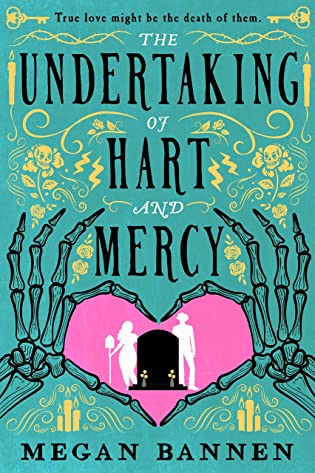 The Undertaking of Hart and Mercy by Megan Bannen
The Undertaking of Hart and Mercy by Megan Bannen Format: eARC
Source: supplied by publisher via Edelweiss
Formats available: paperback, ebook, audiobook
Genres: cozy fantasy, fantasy, fantasy romance
Pages: 448
Published by Orbit on August 23, 2022
Purchasing Info: Author's Website, Publisher's Website, Amazon, Barnes & Noble, Kobo, Bookshop.org, Better World Books
Goodreads
Hart is a marshal, tasked with patrolling the strange and magical wilds of Tanria. It’s an unforgiving job, and Hart’s got nothing but time to ponder his loneliness.
Mercy never has a moment to herself. She’s been single-handedly keeping Birdsall & Son Undertakers afloat in defiance of sullen jerks like Hart, who seems to have a gift for showing up right when her patience is thinnest.
After yet another exasperating run-in with Mercy, Hart finds himself penning a letter addressed simply to “A Friend”. Much to his surprise, an anonymous letter comes back in return, and a tentative friendship is born.
If only Hart knew he’s been baring his soul to the person who infuriates him most—Mercy. As the dangers from Tanria grow closer, so do the unlikely correspondents. But can their blossoming romance survive the fated discovery that their pen pals are their worst nightmares—each other?
Set in a world full of magic and demigods, donuts and small-town drama, this enchantingly quirky, utterly unique fantasy is perfect for readers of The House in the Cerulean Sea and The Invisible Library.
My Review:
Hart Ralston and Mercy Birdsall each think they have a fairly big problem when the story opens. Each other. And they are both so, so wrong, which is what makes this fantasy romance so cozily familiar even in the midst of all the dangerous creatures that are getting more numerous – and ever more dangerous – in nearby Tanria.
What makes their mutual enmity an even bigger problem is that they have to work together – sorta/kinda – in dealing with all of those dangerous creatures. Or at least in handling the remains of all of their victims.
Marshal Hart Ralston’s job is to go into Tanria and hunt down both the dangerous, deadly and also quite dead drudges – as well as get any illegal poachers out of the area before they become victims of those dead and deadly drudges and are turned into drudges themselves.
It’s a thankless job, but somebody has to do it. And lone wolf Ralston prefers to do it alone, so he doesn’t have to try to protect anyone else – and fail at it.
Mercy Birdsall is the only actual working member of Birdsall and Son, one of the undertaking companies in Eternity, just over the border from Tanria. It’s her company’s job to provide funeral rites for the dead victims – and occasionally for the dead monsters – that marshal’s like Ralston bring back from Tanria.
Hart and Mercy got on each other’s bad side the very first time they met over Birdsall and Son’s shop counter. And it’s been all downhill ever since.
Or has it?
Escape Rating B: The Undertaking of Hart and Mercy, besides being a very punny title, is one of those stories that invokes that question about whether two great tastes go great together. This is a fantasy romance, but romance readers may think it leans too much on the fantasy side and fantasy readers may have the same reaction to the romantic angle that Hart and Mercy initially had to each other.
 Or, as in my case, this may seem like a strange setting for a reimagining of the Tom Hanks/Meg Ryan romcom classic movie You’ve Got Mail. Although it does work – particularly because of the marvelously sarcastic nimkilim that deliver the mail – there are a few scenes where it seems like the graft didn’t quite take. Or that the stitching of the graft is just a bit too obvious. Or both.
Or, as in my case, this may seem like a strange setting for a reimagining of the Tom Hanks/Meg Ryan romcom classic movie You’ve Got Mail. Although it does work – particularly because of the marvelously sarcastic nimkilim that deliver the mail – there are a few scenes where it seems like the graft didn’t quite take. Or that the stitching of the graft is just a bit too obvious. Or both.
Not that the idea doesn’t work well in this setting because it does – with the help of the nimkilim. Hart is lonely and withdrawn. He desperately needs to reach out to someone but doesn’t know how and is afraid to try. Hence his anonymous correspondence with his nameless “friend”.
Mercy, on the other hand, is lonely in a crowd. She has family and some friends, but she’s carrying a boatload (literally in this case) of secrets and responsibilities that consume her energy while isolating her from anyone who might be able to help her in dealing with them. Which results in her responses to those letters addressed by heart, from Hart, to his nameless friend. Who turns out to be Mercy, the woman he believes is his worst enemy.
This is kind of a fence-straddling book, complete with the inevitable splinters up its ass. It was presented to me as a romance, and there certainly is a romance in it. But the fantasy setting is more than just setting. It’s an important enough element of the story that the book as a whole doesn’t sit comfortably in romance because it has more than a foot over that line into fantasy.
Even if that foot belongs to a dead body that has become a drudge.
At the same time, as much as I loved the banter between Hart and Mercy, there was something about Mercy’s situation that just didn’t sit right. I never fully got why she couldn’t take over the family business – at least until the villain of the piece took his villainy to heights (or depths) that the business couldn’t survive no matter who was in charge of it. I understood that her father wanted to pass it to her brother – who was not suited to the work AT ALL and did not want it under any circumstances whatsoever. Work that Mercy wasn’t merely suited for but actually loved.
A fact which Mercy’s family totally ignored. She does the work, she loves the work. She wants to keep doing the work. But her entire family decided that the business was a burden on her and that it would be best for her if it was sold. Without asking her what she wanted. (BTW Mercy is THIRTY YEARS OLD and very well able to decide what is best for her for her own damn self.) A lot of story water goes under that bridge before the Birdsall family stops assuming they know what’s best for each other and have an honest conversation about what each of them as an individual actually wants.
The story picked up its pace – or at least stopped frustrating the crap out of me – after that conversation finally happened.
For this reader, the thing is that this was presented to me as a romance, but it reads like a fantasy that includes a romance, which is a bit of a different beast. Both elements have to be present and fully-fleshed out for a fantasy romance to succeed. If only one is working, it falls over.
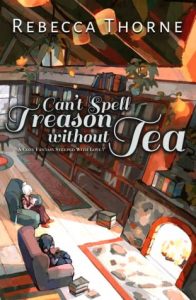 In the end, this doesn’t fall over. It works – although it does take a while to get all of its (auto)ducks in a row. In fact, it works a whole lot like Can’t Spell Treason without Tea and Legends & Lattes. Between the life of the town of Eternity and the Birdsall family dynamic – along with Mercy’s lovable big dog Leonardo – the fantasy is very cozy, with just the right amount of danger. The romance is angsty in a way that really works well, and the issues between Hart and Mercy feel real in spite of the fantasy setting, but also rising at least in part from elements that are integral to that fantasy setting.
In the end, this doesn’t fall over. It works – although it does take a while to get all of its (auto)ducks in a row. In fact, it works a whole lot like Can’t Spell Treason without Tea and Legends & Lattes. Between the life of the town of Eternity and the Birdsall family dynamic – along with Mercy’s lovable big dog Leonardo – the fantasy is very cozy, with just the right amount of danger. The romance is angsty in a way that really works well, and the issues between Hart and Mercy feel real in spite of the fantasy setting, but also rising at least in part from elements that are integral to that fantasy setting.
Readers coming to The Undertaking of Hart and Mercy just for the romance may find this to be more fantasy than they bargained on. But if you loved Legends & Lattes or Can’t Spell Treason without Tea, or if you’re a fan of T. Kingfisher’s Saint of Steel series you’ll fall for The Undertaking of Hart and Mercy every bit as hard as Hart and Mercy eventually realize that they have for each other..

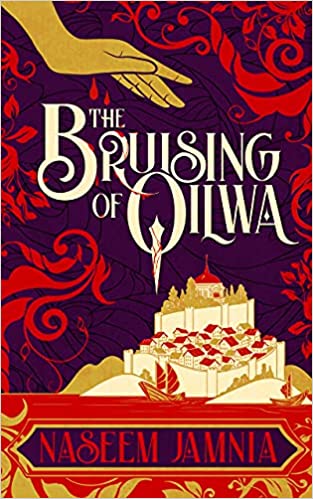 The Bruising of Qilwa by
The Bruising of Qilwa by  Into the Windwracked Wilds (The Up-and-Under, #3) by
Into the Windwracked Wilds (The Up-and-Under, #3) by 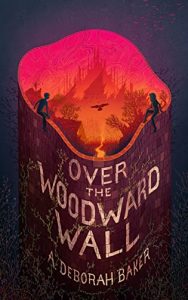 Looking back at my review of the first book in the
Looking back at my review of the first book in the 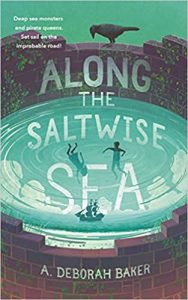 Escape Rating A-: From the beginning, it has seemed as if the direct progenitors of the Up-and-Under were Oz and Narnia. The similarities between the ‘Yellow Brick Road’ and the ‘Improbable Road’ are a bit hard to miss, after all.
Escape Rating A-: From the beginning, it has seemed as if the direct progenitors of the Up-and-Under were Oz and Narnia. The similarities between the ‘Yellow Brick Road’ and the ‘Improbable Road’ are a bit hard to miss, after all.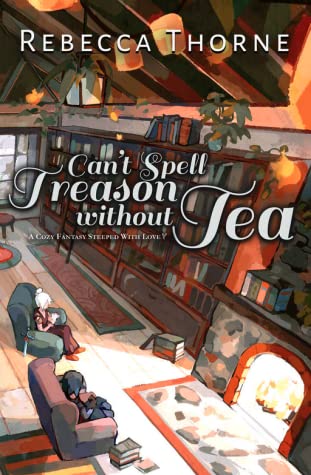 Can't Spell Treason Without Tea by
Can't Spell Treason Without Tea by 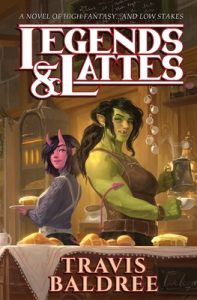 Escape Rating B+: The author calls out her debt to
Escape Rating B+: The author calls out her debt to 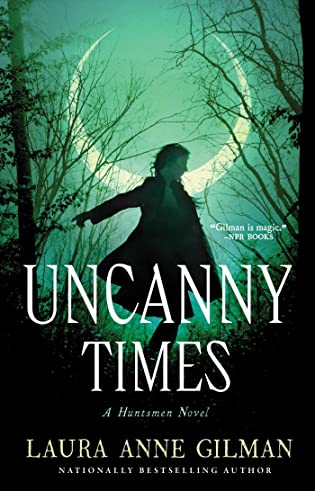 Uncanny Times (Huntsmen #1) by
Uncanny Times (Huntsmen #1) by 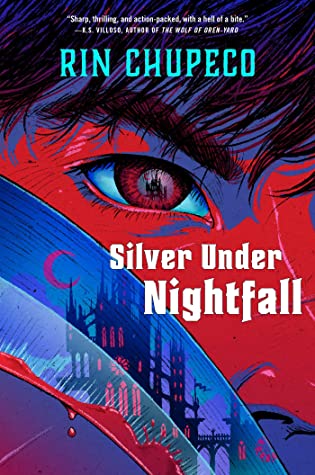 Silver Under Nightfall by
Silver Under Nightfall by 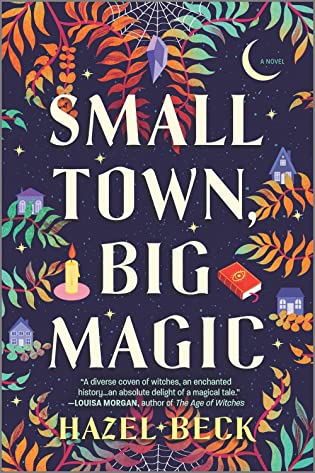 Small Town, Big Magic by
Small Town, Big Magic by 
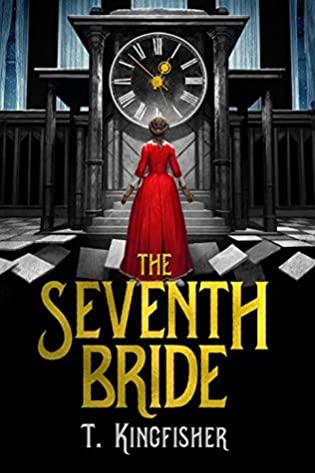 The Seventh Bride by
The Seventh Bride by 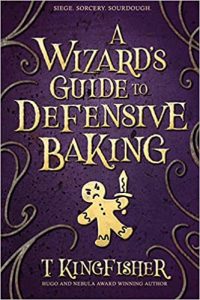 Just like Mona in
Just like Mona in 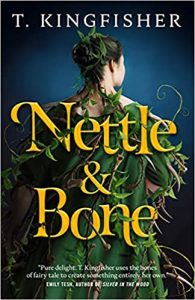 It also reads like a bit of a ‘dress-rehearsal’ for
It also reads like a bit of a ‘dress-rehearsal’ for 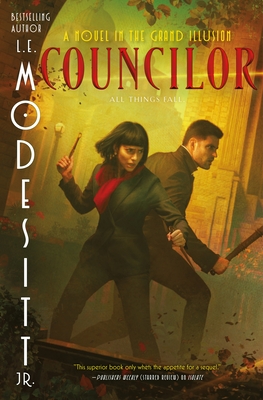 Councilor (The Grand Illusion #2) by
Councilor (The Grand Illusion #2) by 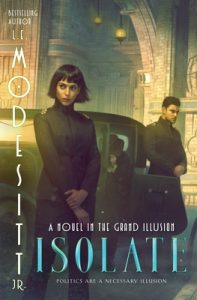 Escape Rating A: Just as with the first book in the series,
Escape Rating A: Just as with the first book in the series, 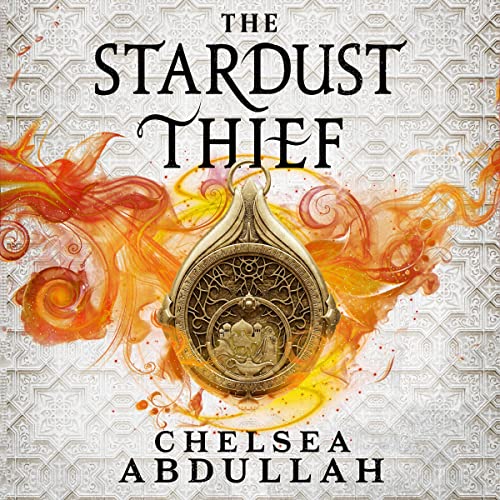 The Stardust Thief by
The Stardust Thief by  But the story is a nearly endless ‘out of the frying pan into the fire’ kind of story, as one near-death adventure – and escaping therefrom – leads directly into another. Much as the tales that Shafia – who we know as Scheherazade – told to the Sultan to keep him from killing her. This adventure is clearly intended to remind readers of
But the story is a nearly endless ‘out of the frying pan into the fire’ kind of story, as one near-death adventure – and escaping therefrom – leads directly into another. Much as the tales that Shafia – who we know as Scheherazade – told to the Sultan to keep him from killing her. This adventure is clearly intended to remind readers of